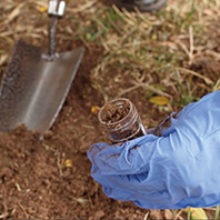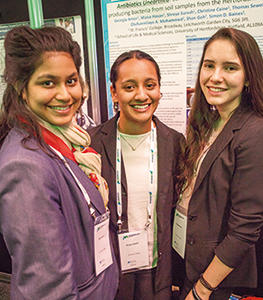Schoolzone: Antibiotics Unearthed: teacher experiences
Issue: Microbiology in Popular Culture
07 November 2017 article

Antibiotics Unearthed has been running successfully for over two years as part of an initiative to crowdsource antibiotic discovery from soil and inspire the next generation of students to consider microbiology or other STEM subjects. One part of the project that has been particularly successful is the Schools Partnership Programme. This programme has schools partner with local universities, allowing groups of students to do a real research project and inspire them to have a career in science.
School students carry out their own research experiment and are supported by the academic partner for the more complex microbiology experiments required to discover any antibiotic. The school teachers, technicians and academic partners attend summer school training in July each year to acquaint themselves with the techniques and processes used before working out the best way to implement the project with their students. The flexibility of Antibiotics Unearthed means that each partnership was slightly different from the next.
During the course of running Antibiotics Unearthed, 17 schools – from Cork to Oxford – have taken part, with many continuing to run it again each academic year. Below are two accounts from teachers who have participated in the Antibiotics Unearthed Schools Partnership.
UTC Oxfordshire
Sue Lea
UTC Oxfordshire is a new school specialising in science and engineering. The school has an extended day with built-in curriculum time for learning real world employability skills, so the Microbiology Society’s Antibiotics Unearthed research programme was an ideal challenge for our sixth form biologists. Thirteen students applied to join this challenging project, a mixture of Year 12 and 13 students studying A-level Biology and the BTEC Extended Diploma in Applied Science.
Our academic partner, Dr Hee-Jeon Hong, Lecturer in Microbiology at Oxford Brookes University, and her PhD student, Sam Connelly, helped us deliver the 14-week project along with enormous support from the Microbiology Society and Oxford Brookes University. Hee-Jeon and Sam led six of our Wednesday morning sessions, when the students were off timetable for two hours each week. The initial sessions developed practical skills and allowed students to experiment with selective media, as well as learning more about the problems of antibiotic resistance. Conventional culturing methods of local soils showed that several antimicrobial producing species could be found using serial dilution. Oxford Brookes University worked with the students on more complex techniques such as bioassays, testing for antibiotic production and testing for any antibiotic resistance of purified bacteria.
After a few days the students realised that we had a huge fungal contamination problem – every plate was covered in fungi which out-competed most of the bacterial species and we think that our agar may have been contaminated in the production process. This was somewhat frustrating but a realistic lesson in science research for the students. Interestingly, having stored these contaminated plates in the fridge for a week or so, there was evidence of additional bacterial growth but we had run out of time to investigate further. Harvey Williams, 17, summarised his experience: “Overall the microbiology project increased my knowledge of many different practical techniques and I developed many different skills that I will be able to use in the future, such as project planning, poster creation, presentation and group work. The project was a really enjoyable experience and also gave me a better understanding of antibiotic resistance and working with university staff.”
The students worked in pairs or threes to create scientific posters summarising their research and presented their findings to Hee-Jeon and Sam at the end of the project. Students Rebekah Vaughan and Rui Manaia were selected to present their poster at the Microbiology Society’s Annual Conference in Edinburgh. This was an incredible two days for the sixth formers – flying to a scientific conference, explaining their own research, listening to lectures, talking to researchers and getting to explore an amazing city. In July, the project finished with a celebratory lunch at Oxford Brookes University and a tour of the biosciences department with Hee-Jeon and Sam. It was a lovely surprise for the students to discover their posters on display at the university.
This experience has left a lasting legacy at UTC Oxfordshire. Not only has one student received an offer to study Microbiology at Reading University, but others are already planning ways to extend and improve their research next year. Those who took part will be mentors for our new Year 12 students. Oxford Brookes have agreed to support the school again and we are modifying our programme in light of the lessons learned. Rebekah Vaughan, 18, summarised her experience: “For me there were several major benefits of this project. Firstly it confirmed my decision to study microbiology at university and provided a topic for my extended project dissertation. Secondly the experience of working with university staff improved my practical and research skills. The creation of a scientific poster and presentation at the Microbiology Society’s Annual Conference was a great learning experience.”
St. Francis’ College
Christine Caine

During the academic year 2016–2017, St Francis’ College were lucky enough to take part in the Microbiology Society’s Antibiotics Unearthed project. Our college worked in collaboration with the University of Hertfordshire over a period of four months, with the aim of growing and isolating bacteria from soil samples collected from the local area and then analysing these bacteria to see if any of them produced antimicrobial substances. The aim of the project is to raise awareness of the current problem we are facing with antibiotic resistance and to see if we could maybe find the next new antibiotic!
Nine Year 12 students were involved and the project was carried out either after school or during lunchtime, with each session lasting approximately 45–60 minutes. The majority of the sessions, including serial dilutions and plating out of the dilute soil samples, took place at the college. Some of the more technical practical work, such as the DNA purification, was carried out at the university. Our students loved their day spent in the university labs, with one saying: “It was brilliant to work in a professional laboratory with all of our own sets of equipment.”
This project was highly rewarding both from a teaching perspective and also for the students, giving them a unique opportunity to take part in some real, relevant science which was challenging, interesting and completely up-to-date. An additional bonus was that this particular year group will be able to include this on their personal statements for their university applications later this year.
The project culminated in a trip to the Microbiology Society’s Annual Conference in Edinburgh with three of our girls presenting a poster of the work that they carried out (see picture). This was a fantastic experience with the girls having to answer some difficult questions posed by other delegates which they handled brilliantly.
Hannah Forrest
Public Engagement Officer
[email protected]
